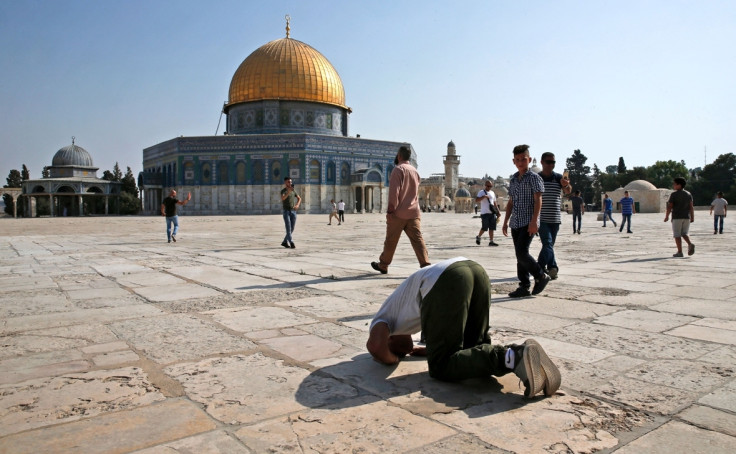Why Trump supporters believe moving the US embassy to Jerusalem could trigger Armageddon
The President's plan appeals to two of his key power bases in the US, right-wing Jews and Christian fundamentalists.
Why is moving the US embassy from Tel Aviv to Jerusalem so controversial?
US President Donald Trump is widely expected to say in a speech today (6 December) that he plans to move his country's embassy to Jerusalem, which would mean America effectively recognising Jerusalem as the capital of Israel.
That would overturn around 70 years of international consensus, and would be seen by many as the US vacating its role as the region's neutral broker. Others say it would effectively signal the end of moves to achieve peace between Israelis and Palestinians for the foreseeable future.
Why is Trump making this move?
This was a campaign promise by the property mogul when he ran for the White House.
The move appeals to two of his power bases in the US, right-wing Jews and Christian fundamentalists.
US Evangelicals pump around $500m a year into Israeli tourism and charities, and have backed the country's conservative politics in a controversial alliance.
Evangelical Christians make up the biggest pro-Israel bloc in the US. Support for Israel is stronger among American evangelicals than it is even among American Jews. According to a poll conducted by the Pew Research Center, 82 percent of white evangelicals think God gave Israel to the Jewish people.
In July, Israeli Prime Minister Benjamin Netanyahu took time out during a visit to Hungary to address the Washington conference of the Christians United for Israel by satellite.
"We have no better friends than you," said Netanyahu. "You are always there for us."
Some Christian fundamentalists believe Israel and Jerusalem will play an important role in the apocalyptic end of days and the Second Coming of Christ. This they prophesy will be triggered by return of the Jews to the Holy Land sparking an almighty conflagration with the many enemies of Israel. Shifting the US embassy to Jerusalem could help hasten the inevitable Battle of Armageddon.
Indeed, the Arab and Muslim world is already reverberating with blood-curdling threats at the prospect of the embassy move. For example, a spokesman Turkish president, Recep Tayyip Erdoğan, said the US was "plunging the region and the world into a fire with no end in sight".
In ideas popularised by the Left Behind book series, which sold tens of millions of copies and was made into several movies, the "antichrist" gathers all the world's armies to attack the last remaining Christians and Jews in Israel, before Christ himself intervenes to destroy the invading army.
But it is a delicate alliance. Some observant Jews suspect Christian fundamentalists of secretly being missionaries, while liberal Jews abhor the conservative politics of evangelicals.
What is the reaction to the anticipated move?
Veteran PLO negotiator Saeb Erakat shifting the US embassy to Jerusalem would mean America "disqualifying itself from playing any role in any initiative towards achieving a just and lasting peace".
King Abdullah of Jordan said the move could be "exploited by terrorists to stoke anger, frustration and desperation in order to spread their ideologies".

Islamist group Hamas said the move would ignite a third Palestinian uprising or intifada in Arab streets across the region.
Moderate Muslims around the world have urged Trump not to take this step as it would be a body blow to hopes of peace in the Middle East.
The potential US move is also causing great concern in foreign ministries in the West.
Why is Jerusalem important?
Both Jews and Paelstinians claim it as their capital.
In the Jewish religion, this is where the Bible's King David built his city and where their temples stood on Temple Mount.
In Islam, the same mount is where the prophet Muhammad ascended to heaven, making it the third holiest site in their religion behind Mecca and Medina.
How did Jerusalem become such a contested city?
The war that followed Israel's declaration of independence in 1948 left Jerusalem a divided city, like Berlin in the cold war, that fell into western and eastern sectors under Israeli and Jordanian control respectively.
But after the 1967 six-day war, Israel captured the eastern side, included the historic Old City – an act that was never recognised internationally.
Many believe if the US moves its embassy that would recognise the city's current boundaries, as well as the significant territorial gains made by Israel during the six-day war.






















